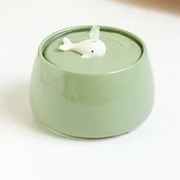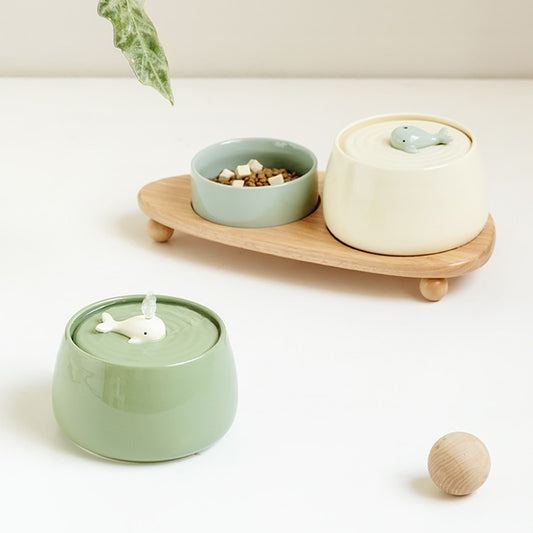Can Cats Eat Mango? Exploring The Mango Munchies
Cat Water Fountains Australia
Share This Article
| Summary: Yes, cats can eat mango, but it should only be given to them in moderation and with some important precautions. Fruits like mango are high in sugar, and cats' digestive systems are not designed to handle large amounts of fruit. Feeding mango to cats can lead to gastrointestinal upset and other health issues. |
As feline enthusiasts, we often wonder about sharing our favourite fruits with our furry companions. Mango, with its juicy and sweet flavour, is a delicious tropical fruit enjoyed by many humans. But can cats enjoy this delightful treat too? In this comprehensive guide, we'll explore whether cats can eat mango and the potential benefits and risks associated with offering this fruit to our feline friends.
Cat Hair Remover Roller
Buy Now
1. Understanding Feline Dietary Needs
Before we delve into the specifics of mango, it's crucial to understand the unique dietary needs of cats. As obligate carnivores, cats require a diet rich in animal-based proteins to thrive. Their digestive systems are optimised to extract essential nutrients from meat sources, making it vital for their overall health and well-being.
2. Mango and Cats: The Verdict
Yes, cats can eat mango, but it should only be given to them in moderation and with some important precautions. Mango is a safe fruit for cats when offered as an occasional treat, but it should never replace their regular meat-based diet.
3. Health Benefits of Mango for Cats
Mango can offer some potential health benefits for cats when given in small quantities:
Vitamins and Minerals: Mango is rich in essential vitamins and minerals, such as vitamin A, vitamin C, and potassium. These nutrients can contribute positively to a cat's overall health, supporting their immune system, skin, and vision.
Dietary Fiber: Mango contains dietary fiber, which can aid digestion and help prevent constipation in cats. Offering a small piece of mango can be beneficial for cats struggling with hairballs or irregular bowel movements.
4. Precautions and Risks of Mangoes
While mango can provide some health benefits, there are also potential risks to consider when feeding this fruit to cats:
Allergies: Some cats may be allergic to mango or have sensitivities to certain fruits. It's essential to monitor your cat for any signs of allergic reactions, such as itching, hives, or gastrointestinal upset, and discontinue offering mango if any adverse reactions occur.
High Sugar Content: Mango is naturally high in sugar, which can be problematic for cats, especially those with diabetes or weight issues. Excessive sugar intake can lead to weight gain and other health complications.
Pesticides and Additives: If feeding mango to your cat, ensure it is fresh, ripe, and organic. Avoid offering mangoes that have been treated with pesticides or other harmful additives, as these can be toxic to cats.
5. How to Safely Feed Mango to Cats
If you decide to share a small piece of mango with your cat, follow these guidelines to ensure their safety and enjoyment:
Offer Small Portions: Cats have sensitive stomachs, so only give a tiny amount of mango as a treat. Watch for any adverse reactions or digestive upset.
Remove the Pit and Skin: Before offering mango to your cat, ensure it is thoroughly peeled and pitted. The pit is a choking hazard, and the skin can be challenging for cats to digest.
Introduce Gradually: If your cat has never had mango before, introduce it gradually to see how they respond to this new treat.
Consult Your Veterinarian: If you have any concerns about feeding mango to your cat, or if your cat has any pre-existing health conditions, consult your veterinarian for personalised advice.
6. Final Thoughts on the Mango Munchies
Cats can enjoy small amounts of mango as an occasional treat. Mango provides vitamins, minerals, and dietary fiber that can be beneficial to cats in moderation. However, it should never replace their regular meat-based diet, as meat remains essential for their overall health and well-being.
As responsible pet owners, we must prioritise our cats' dietary needs and make informed decisions about the treats we offer them. If you choose to share mango with your feline friend, remember to offer it in small portions, remove the pit and skin, and monitor for any signs of allergic reactions or digestive issues.
A happy and healthy cat is a cherished companion, and treating them to safe and enjoyable treats can enhance the bond we share with these wonderful creatures.
Note: This article is intended for informational purposes only and should not be considered as veterinary advice. If you have specific concerns or questions about your cat's diet, it is recommended to consult with a qualified veterinarian.









